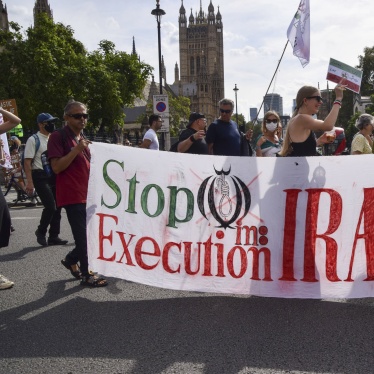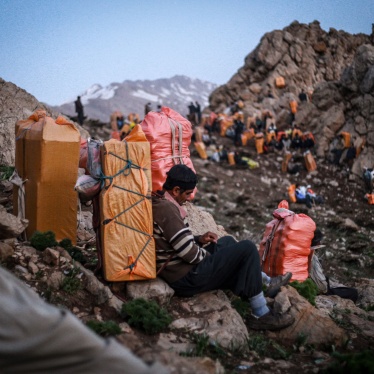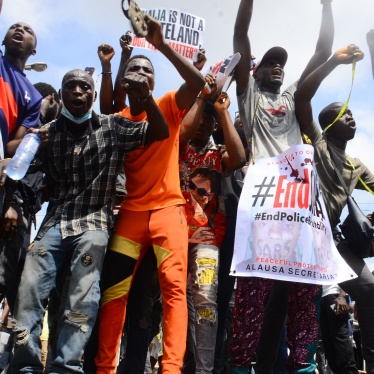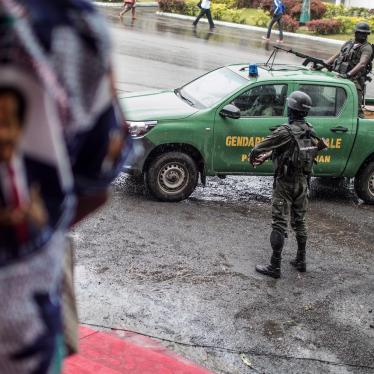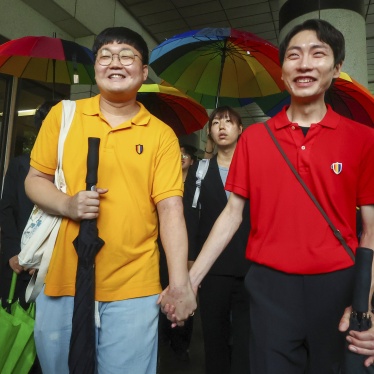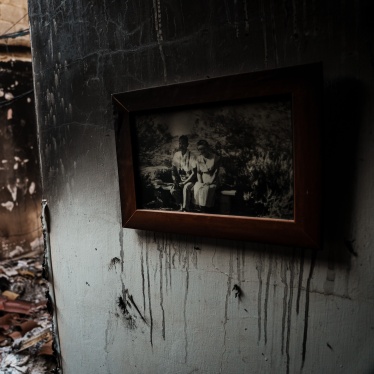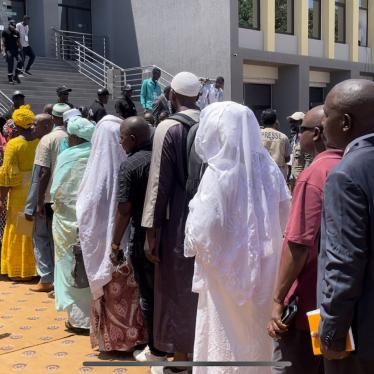May 31, 2016
President Ary Graça
Fédération Internationale de Volleyball
Château Les Tourelles
Ch. Edouard-Sandoz 2-4
1006 Lausanne
Switzerland
RE: Unjust ban on women at FIVB volleyball tournaments in Iran
Dear President Graça,
We are writing regarding the upcoming July 1-3 FIVB Volleyball World League in Tehran, which appears set to continue the effective ongoing exclusion of women spectators from FIVB events in Iran in blatant violation of your organization’s own fundamental principles. Human Rights Watch has been in contact with the FIVB on this topic for more than two years, and we seek answers to our questions below concerning how you plan to address the continued ban on women attending your tournaments in Iran.
At this moment, the FIVB's Persian website states that women will not be able to purchase tickets for the July 2016 games in Tehran due to "limited space for female spectators" (per screen shot in the Appendix). Last year, Human Rights Watch brought to your attention the violation of the FIVB’s Constitution posed by the fact only men could buy tickets at the 2015 World League matches. This new statement appears designed to obscure the fact women are still banned from your 2016 tournament in Tehran’s Azadi Stadium.
Since the Iran Volleyball Federation was documented to exclude women from World League tournaments in 2014, 2015 and also the FIVB’s Kish Island beach volleyball tournament in February 2016, we question whether this statement is yet another way to deprive Iranian women of their right to purchase tickets and attend the FIVB’s international tournament.
Moreover, if the FIVB genuinely is allowing some women spectators to attend, we would like to know why the FIVB still requires spectators to buy tickets on the basis of their gender, and in doing so, limiting the space available for female spectators.
In January 2016, the FIVB announced that it had received assurances from Iranian tournament organizers that the Kish Island Beach Volleyball tournament would “be open to fans from all age groups and genders. This will include families and women.” The FIVB had assured Human Rights Watch that no women would be turned away from the turnstiles, an assurance which proved false. As documented in news stories and social media posts from inside Iran, a number of women who sought to attend the International Volleyball Federation’s beach volleyball tournament on Kish Island were denied entrance when they tried to attend the tournament.
Some of these women reported that after they were turned away, they retreated to a neighboring cafe to watch the games from the rooftop, and posted photos and commentary on social media. Others told Human Rights Watch that they watched from the beach outside, and witnessed more women being turned away at the gates.
It was not just Iranian women who were denied their rights: The mother of a Norwegian volleyball player, Geir Eithun, was also expelled. He called it “blatant, obvious segregation.” “We were on our way out of the arena, and we saw several women who were not allowed in," he told Norway’s NRK News.
Considering the repeated failures of the Iranian authorities to allow female spectators to attend the games as required, we were disappointed to note that the FIVB called the exclusion of women a “misunderstanding” and to consider the handful of selected women present as a “success.”
Human Rights Watch has repeatedly raised concerns with the FIVB regarding the 2012 ban on women spectators at volleyball games as well as the threats, arrests, and imprisonment of women who protested the ban since 2014. Despite the FIVB’s assurances that the games would be open to female spectators, recent events have shown that the Iranian authorities are not complying with the rules.
We would therefore appreciate your answers to the following questions:
-
What measures did FIVB take to ensure that women could attend the beach volleyball tournament on Kish Island?
-
Did the FIVB take any measures to have its own officials at the gates to stop women being turned away at the Kish Island tournament?
-
On what grounds was the FIVB able to call the exclusion of women –“activists” or not – justified?
-
On what grounds was the FIVB able to claim that the exclusion of women was merely the result of some “misunderstandings” and that Iranian authorities had the “best intentions,” given the systemic nature of gender discrimination?
-
What steps has the FIVB taken to ensure women can attend the World League matches in Tehran this July?
“No discrimination” is one of FIVB’s “fundamental principles” in its constitution (Section 1.5.4). In view of the blatant gender discrimination and exclusion of female spectators at the FIVB’s last three tournaments in Iran, we strongly urge the FIVB to:
-
Investigate the exclusion of female spectators during the volleyball games on Kish Island in February.
-
Urge Iranian authorities to repeal the ban, prior to the FIVB World League matches in July 2016.
-
Ask Iranian volleyball officials to announce publicly how women can buy tickets online and attend these matches.
-
Request that Iranian authorities issue instructions to security officials at the games, and to all other law enforcement bodies, to ensure that women and girls can safely attend volleyball matches.
-
Declare that Iran will not be allowed to host future FIVB tournaments unless women can safely attend men’s volleyball matches.
We thank you for your attention to this important issue, and look forward to your answers.
Sincerely,
Minky Worden Sarah Leah Whitson
Director of Global Initiatives Director, Middle East and North Africa Division
Human Rights Watch Human Rights Watch
Appendix: Screen Shot of Persian-Language FIVB Website Excluding Women
Translation of relevant text:
As the designated seats for female spectators are limited, currently we do not sell tickets to women as the capacity has already been reached.
